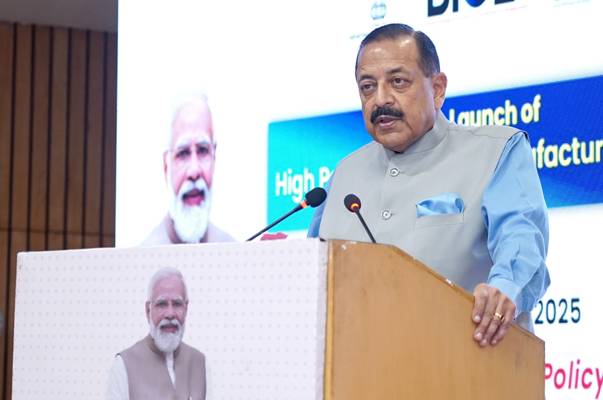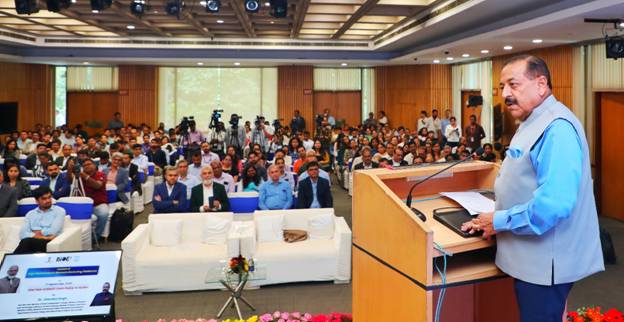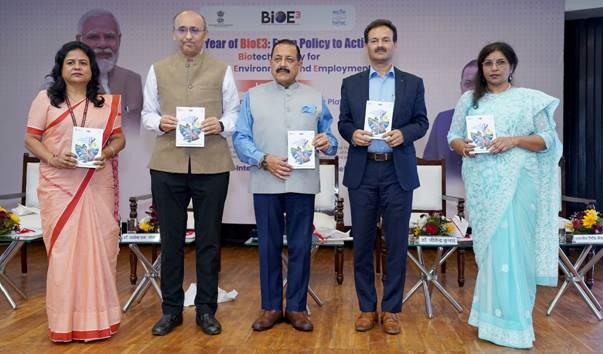India now accounts for 21 out of 121 Bio-Companies globally, says Minister Dr. Jitendra Singh
India now accounts for 21 out of 121 Bio-Companies globally, says Minister Dr. Jitendra Singh
Union Minister of State (Independent Charge) for Science and Technology; Earth Sciences and Minister of State for PMO, Department of Atomic Energy, Department of Space, Personnel, Public Grievances and Pensions, Dr. Jitendra Singh launched the High-Performance Biomanufacturing Platforms under the BioE3 (Biotechnology for Economy, Environment and Employment) Policy, calling the initiative a key step in positioning India as a global hub for biotechnology-led growth.
Speaking at an interactive meet of the Department of Biotechnology (DBT) and BIRAC with industry stakeholders at India International Centre here, Dr. Jitendra Singh said, “India now accounts for 21 out of the 121 Bio-Companies globally. This is not a small achievement for a country that once followed others; today, we are among the first movers in institutionalising biomanufacturing policy,” he said.
The Minister said, the government’s focus on biomanufacturing was part of a larger vision to make India self-reliant in critical sectors and reduce dependence on imports. “BioEnablers are the foundation of India’s next wave of biotechnology-led growth. By providing world-class platforms, tools, and infrastructure, BioEnablers empower our scientists, StartUps, and industry to move faster from ideas to innovations, and from laboratories to markets,” he said.
The newly launched platforms bring together 21 advanced bio-enabler facilities across the country. These facilities will offer shared infrastructure for startups, small and medium enterprises, industries, and academic institutions to test, scale, and commercialise technologies. The scope of work spans microbial biomanufacturing, smart proteins, sustainable agriculture, functional foods, carbon capture, marine biotechnology, and next-generation cell and gene therapies.
Highlighting India’s recent strides, the Minister noted that the country’s bioeconomy has grown from about $10 billion to nearly $100 billion today, with a target of reaching $300 billion in the coming years. He also underlined the expansion of biotech startups, which have risen from just 50 a decade ago to over 13,000 today, supported by nearly 100 incubators under BIRAC. “India now accounts for 21 of the 121 bio-companies globally. This is not a small achievement for a country that once followed others; today, we are among the first movers in institutionalising biomanufacturing policy,” Dr. Jitendra Singh said.
The Minister linked the initiatives to India’s broader strategic goals, pointing out that biomanufacturing not only drives innovation in health, agriculture and environment but also contributes to reducing petroleum imports and strengthening the country’s geopolitical standing. He added that “BT” (Bio-Technology), much like IT in the 1990s, is set to become a defining buzzword of India’s growth story in the decades ahead.
DBT Secretary Dr. Rajesh S. Gokhale described the launch as a “pioneering step” that would accelerate India’s leadership in the global bioeconomy and enable sustainable solutions across multiple sectors.
The facilities announced include pilot-scale plants for specialty chemicals, fermentation hubs for functional foods and drug intermediates, GMP-grade facilities for gene delivery vectors, and state-of-the-art setups for monoclonal antibodies, enzymes, and mRNA-based precision medicines.
Dr. Jitendra Singh also stressed the importance of strong communication and outreach to engage stakeholders and the youth, recalling Prime Minister Narendra Modi’s reference to the BioE3 Policy in his Independence Day address. He said such visibility signals the importance of biotechnology in shaping India’s future.
As India looks ahead to its centenary of independence, the Minister said biotechnology would be a cornerstone of the “Viksit Bharat” vision. “Just as IT once became a buzzword, biotechnology will be the torchbearer of the coming decades,” he said.
Industry leaders and researchers participating in the event highlighted the critical role of government-backed facilities in enabling frontier technologies such as CAR-T cell therapy, mRNA platforms, marine biofoundries, synthetic biology, and probiotics. Several entrepreneurs noted that while early-stage support from DBT and BIRAC has been instrumental in giving them a “break,” long-term sustainability will depend on strong clinical validation, international collaborations, and private investment. They pointed out challenges such as lack of large-scale indigenous production of vectors and plasmids, regulatory hurdles for probiotics, and the need for greater integration of marine and blue economy opportunities into the biomanufacturing ecosystem.
Responding to the suggestions, Dr. Jitendra Singh underscored that BIRAC’s role was to provide initial handholding, but industry must eventually draw global partners and investors to sustain and scale up. He urged companies to look beyond replication and aim for leadership in next-generation technologies such as advanced CAR-T, futuristic therapies for neurological disorders, and marine biotechnology. The Minister also called for closer academia-industry linkages, theme-based programmes, and stronger communication strategies to ensure that biomanufacturing outcomes are validated, visible, and widely adopted.
The event saw active participation from senior officials of DBT and BIRAC, including Dr. Jitendra Kumar, MD, BIRAC, along with scientific advisers and representatives from academia and industry who shared insights on emerging biomanufacturing hubs, underscoring the collaborative effort driving India’s bioeconomy.


